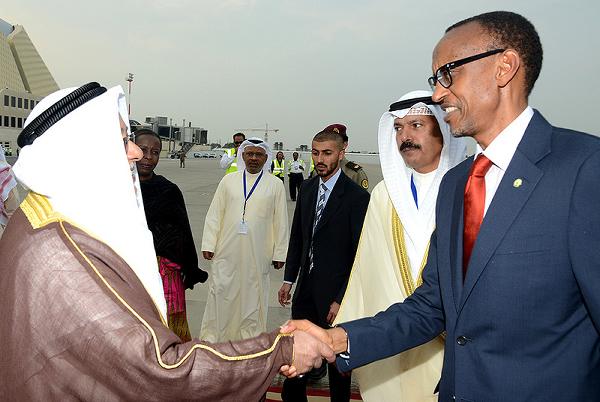African and Arab leaders ended a two-day summit in Kuwait on Wednesday by calling for closer cooperation on the political and economic levels, as well as in the fight against terrorism.
The leaders issued the Kuwait Declaration which called for accelerating economic integration in the Arab world, which includes oil-rich Gulf States and investment-thirsty African states.
They called for the creation of a joint "Africa-Arab Financing Mechanism" to fund programmes and projects, under a plan which was adopted at a summit in Libya in 2010.
But there was no mention of any moves for an Africa-Arab common market, as recommended by businessmen. The Kuwait Declaration strongly condemned terrorism.
Kuwait Emir Sheikh Sabah al Ahmed al Sabah pushed for low interest loans for Africa and investment in the continent
It urged member states to "enhance cooperation and coordination to combat terrorism in all its forms," and to criminalise the payment of ransoms to terrorists.
On the opening day of the summit, Kuwait's Emir Sheikh Sabah al-Ahmad Al-Sabah pledged $1 billion (740 million euros) in low-interest loans and the same amount in investments to African states in cooperation with the World Bank.
Thirty-four heads of state, seven vice presidents and three heads of government attended the gathering, which brought together 71 countries and organisations. The meeting was the first of its kind since the 2010 Libya summit, which was held prior to the Arab Spring uprisings that toppled long-term dictatorships in the region.
Africa's wealth under-utilised
Africa has huge resources of raw materials, agriculture and energy but lacks investment. According to the World Bank, the continent needs about $30 billion a year just to develop its energy sector.
The International Monetary Fund (IMF) said African economic growth was a solid 5 percent in 2012 despite the global economic crisis. Growth is forecast to ease slightly to 4.8 percent this year and rebound to 5.1 percent in 2014.
Africa has 12 percent of global oil reserves and 42 percent of its gold deposits. The discovery of large quantities of natural gas off its east coast has added to the continent's economic potential.
On the other hand, states of the energy-rich Gulf Cooperation Council have accumulated huge surpluses thanks to persistently high oil prices. A majority of their assets are invested in the United States and Europe.
A wake-up call from the African Union
Speaking on behalf of the African Union, Nkosazana Dlamini-Zuma, the AU Commission chairperson, defined the summit as one of the initiatives that will ensure Africa's prosperity.
"As Africa celebrates its Golden Jubilee, we are determined to bequeath to the next generations a continent that is integrated, peaceful and prosperous," she said.
AU commission chairperson Dlamini Zuma urged for stronger ties between Africa and the Arab world
"We are determined to make the positive trajectory that we are currently on irreversible and to build an Africa that takes its rightful place".
Dlamini-Zuma reminded participants that Africa's opportunities outnumber its challenges.
"Africa is a new growth pole, where returns on investments in virtually every sector, from infrastructure to ICT, and from retail, health to manufacturing, are higher than any other part of the world," she said.
Dlamini Zuma went on to say that as developing countries, Africa and the Arab region share a common past and future.
"Over the last decade, the two regions experienced progress, but at the same time we have experienced conflicts, aggression and terrorism, with terrible consequences on our people, especially women, children and the elderly," she said.



